CoE Social Rights Committee President Palmisano to Eurofora on LBGTI and Poor People
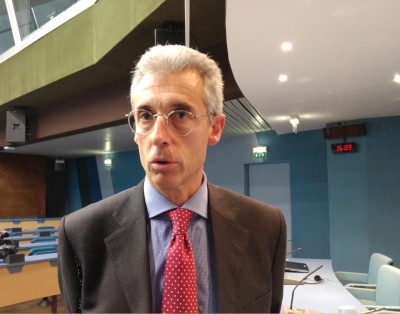
*Strasbourg/CoE/Angelo Marcopolo/- On the occasion of the Annual Publication, of the PanEuropean Organisation's Social Rights' Committee's (ECSR) Conclusions for 2015, which found 31% Violations of CoE's Social Charter, in cases mainly of Families and Children, but also Immigrants, "Eurofora" asked ECSR's President, Guiseppe Palmisano, during a Press Conference Today at the CoE in Strasbourg, whether Controversial "Same Sex Mariages" and/or Children given to Homosexuals, as well as so-called "Surrogate Mothers", if, when, and where all this might, eventualy, be allowed, (despite the Persistent Legal Validity of Article 12 of the PanEuropean Treaty, which speaks only about a Natural Family, between Men and Women), could see, or not, European Social Charter's advantages Extended to them, while, later-on, we also asked Palmisano whether, at the same time, the current Economic and Social Crisis still existing in many Countries presents some Big Challenges for Poor People, and How could they Defend their Elementary Social Rights, since they usually don't belong to Trade Unions, (being Jobless, and/or in Precarious situations, without Money, etc), while ECSR's Mechanism allowed Access only through Ciollective Complaints, triggered mainly by TradeUnionists, (unlike the European Court of Human Rights, where Every Victim can, in Principle, Defend his/her Rights also by an Individual Application to the Court).
President Palmisano Replied, Carefuly, to the First Two Questions, mainly by attesting the Fact that, until now, the ECSR "had Not yet to Deal with that Problem", about cases which are, indeed, Controversial, and many still under Discussion inside various CoE's High Instances, (including, f.ex., after a Recent Wave of CoE Member Countries' moves to Try to Protect, by their National Constitutions, the Natural Famly, between Men and Women, and/or the Natural Birth and UpBringing of Children, by their Natural Fathers and Mothers, etc), so that he Felt Hindered to Give any Concrete Replies on those issues.
However, as far as it concerns only the so-called "Surrogate Mothers", (i.e. Poor Women notoriously Exploited in order to Rent their Belly, particularly to Homosexual couples, in order to Give Birjh to a Child made by Strangers, though Artificial, In Tube, Inseminations, etc; If, when and where this currently Illegal in most countries, practice, might, eventualy, be allowed), after brief reflexion, he appeared to lean towards a rather Affirmative Reply to that Question : May be, as long as they could be considered as "Mothers", then they Might, eventually, ask to benefit from CoE's Social Charter's "Maternity" Rights, he speculated.
But, "indeed", the current Economic and Social situation provokes a lot of Bic Challenges, as far as Social Rights are concerned, in most CoE's Member Countries, making Poor People's protection much More Harder than before, ECSR's Head admitted subsequently, in Reply to anOther couple of "EuroFora"s Questions, later-on :
=> Therefore, President Palmisano "Appealed", first of all, to CoE's 47 Member States, to realize the Fact that, in substance, the Elementary Social Care for the Poorest People has become, Today, perhaps the Most Important Priority of all, that they must Try to Meet with all means available, and despite current Financial Restrictions
+ Moreover, "if they are Realy Good Trade Unions", all those already involved in CoE's "Collective Complaints"' procedures, i.e. Able to Trigger an ECSR Check on a concrete Issue of Social Rights, should Find, in real practice, Ways to Defend Poor People, themselves, Stressed CoE's Social Watchdog's Chief, in his Replies to the above-mentioned "Eurofora"s Questions.
Last, but not least, while declaring his general preference for "Collective Complaints", as "more Appropriate for Social Rights' matters", as he told us, President Palmisano also noted, that, "indeed", among those NGOs which are already allowed to Trigger ECSR's Mechanism in a certain case, are also certain Associations for Human Rights", which, obviously, could serve here.
Naturally, given also the Fact that really Poor People usually are Not Members of Unions, Neither have any kind of Strong Lobby behind them, but, on the Contrary, are often Isolated and Need somebody to Care for them, (f.ex. a Christian Caritative NGO, as in a few recent cases). Otherwise, ECSR's Collective Complaints' mechanism wouldn't work here on an Fairly Equal foot with Other possible Beneficiaries of Scarce, nowadays, Resources, who might abuse of some very well Networked Lobbies at their exclusive disposal.
(../..)
***
("DraftNews", as already send to "Eurofora"s Subscribers/Donors, earlier. A more accurate, full Final Version, may be published asap).
****
Main Menu
Home Press Deontology/Ethics 2009 Innovation Year EU endorses EuroFora's idea Multi-Lingual FORUM Subscribers/Donors FAQs Advanced search EuroFora supports Seabird newsitems In Brief European Headquarters' MAPs CoE Journalists Protection PlatformBRIEF NEWS
- 00:00 - 02.06.2021
- 00:00 - 18.10.2020
- 00:00 - 19.06.2020
- 00:00 - 18.05.2020
- 00:00 - 20.04.2020
- 00:00 - 02.02.2020
- 00:00 - 09.12.2019
- 00:00 - 27.11.2019
- 00:00 - 16.11.2019
Popular
- Yes, we could have prevented Ferguson riots says World Democracy Forum's Young American NGO to ERFRA
- Spanish People Elect CenterRIGHT Majority with 1st Party and Total of 178 MPs (6 More than the Left)
- Pflimlin's vision
- The European Athletic "Dream Team", after Barcelona 2010 Sport Championship Results
- Source Conseil d'Europe à ERFRA: Debatre Liberté d'Opposants à Loi livrant Mariage+Enfants à Homos ?
- Head of BioEthics InterGroup, MEP Peter Liese : "Embryonic stem cell research reaching its END" !?
- Spain: Jailed Turkish Terror suspect with Explosive,Drones,Chechen accomplices stirs Merah+ Burgas ?
- UN Head Ban Ki Moon at CoE World Democracy Forum : - "Listen to the People !"
Latest News
- EUOmbudsmen Conference 2022: Digital Gaps affect People's Trust threaten EF Project on EU Future ?
- French Election : Black Out on Virus, but Obligation for Fake 'Vaccines" Challenged
- Both French Presidential Candidates point at "Humanism" in crucial times...
- France : Zemmour = Outsider may become Game Changer in Presidential + Parliamentary Elections 2022
- PACE President Cox skips Turkey Worst (Occupation) case compared to Russia (DeMilitarisation) query
Statistics
Visitors: 56846102Archive
Login Form
Other Menu
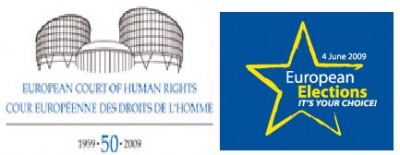
Ten Years of ECHR : 1998 - 2008 show need of Revival in 2009-2010 coinciding with 2009 EU Election
A threefold, coordinated move by new Top French Political actors in the 2009 EU Parliament Elections, expressed in Strasbourg a will to boost Europe's Political dimension close to Citizens' concerns, going from protection of Economy to defence of Human Rights.
The move met an exceptional ECHR's call for a "revival" of Human Rights' protection mechanism', in a Mega-Conference, early 2010.
Obviously focusing on June 2009 Elections to EU Parliament, it involved from the outset the recently nominated "dual" Head of French Governing Party (UMP) Michel BARNIER and Rachida DATI :
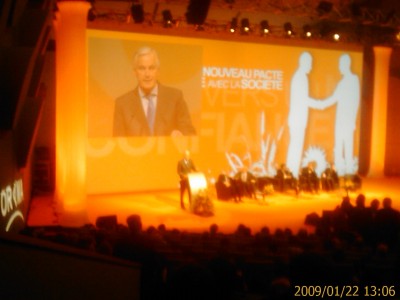
- "As President Sarkozy has clearly said, we (France) are in favor of a Strong, Sovereign and Independent, Political Europe, which protects its Citizens, and not for a large Super-Market, nor for a Europe under influence",
"This goes for everything, including Energy", added to "EuroFora" the experienced former EU Commissioner, Minister of Foreign affairs, currently of Agriculture and Sarkozy's new pick as Leader of the Governing party UMP to EU 2009 Election, Michel BARNIER .
- Human Rights are important because they are at the Heart of the Political Europe that we aspire for : I.e. a Europe able to act and protect its Citizens, stressed also the New French Minister for European affairs, Bruno LE MAIRE, while meeting Strasbourg's Journalists at his first visit to the CoE.
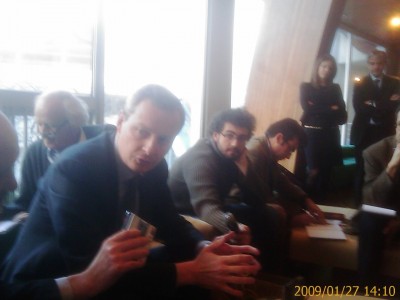
This is one of the main interests for CoE, which is also a natural place for cooperation between EU countries and Russia or Turkey, which was recently helpful at the Middle East crisis, he added.
The move gained momentum with French Minister of Justice, Rachida Dati's main observations at ECHR's 5Oth Anniversary :
- "While we are seeking Europe's Borders and Identity, you (ECHR) remind us also of its Values", Human Rights, Dati noted.
Citizens seek more and more often ECHR's help, and the tempo accelerates, Europa awaits a symbol, while national legal orders are not freezed
And she expressed "support" to ECHR President Jean-Paul Costa's call to satisfy the vital need to revigorate the PanEuropean Court by deciding big changes at a High-Level Conference open to a large audience, a kind of "Etats Generaux" of Human Rights, at the beginning of 2010.
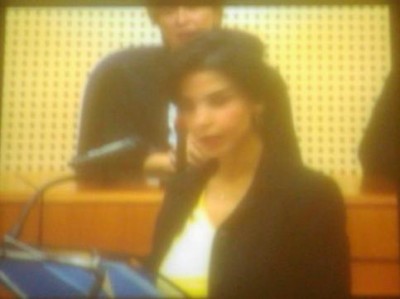
It's not so much the recently growing number of applications for Russia or Ukraine etc, which seems to be Costa's main concern : In fact, the cases declared "admissible" are much fewer...
But rather the persistent violations of Human Rights, sometimes very grave (ie. murders, torture, abritrary deprivation of liberty, oppression of freedom of speech, destructions of homes/properties, etc), despite numerous, repeated condemnations by ECHR. So that CoE's Ministers, due to "supervise execution" of ECHR's judgements, are overloaded.
F.ex. most Media noted that Turkey still remains, even in 2008, the 1st among 47 CoE member States in the number of condemnations by ECHR : 257, compared to 233 for Russia, with a population more than the double..
The problem is that it's not the 1st time at all : During all the last Decade 1998-2008, Turkey was condemned by ECHR much more than any other State, and for particularly grave violations :
- 1.652 condemnations, compared to 605 for Russia, 548 for Poland, 494 for France, 476 for Ukraine, etc.
Italy's second place with 1.394 condemnations is a misleading false appearance : In fact, most of them (999) concern mere "procedural delays" in national courts. Same for France.
On the contrary, Turkey was condemned 180 times for Killings, 192 times for Torture or Inhuman/Degrading treatments, 340 times for arbitrary deprivation of Liberty, 528 times for "Unfair trial", and 169 times for oppression of Freedom of speech, (etc). And the latest, 2008 numbers, indicate no change in this trend, (See supra).
The current Spanish CoE Presidency (November 2008 - May 2009) has made of the implementation of ECHR's judgements its 1st Priority.
ECHR's President, Jean-Paul Costa, stressed in its 2009 Annual Press Conference, CoE Member States' obligation to implement the judgements, according to Article 46 of the European Convention on Human Rights.
Moreover, if CoE's Committee of Ministers delays to ensure implementation, then, the repetition of violations in similar cases provokes a multiplication of complaints tabled to the Court, which overload the mecanism for the protection of Human Rights, denounced Costa.
A series of Debates on "the situation of Human Rights in Europe", focusing on the "need to fight against Impunity" of perpetrators of grave crimes, is currently prepared by CoE's Parliamentary Assembly for the session of June 2009.
The final Timing comes shortly AFTER the EU Elections, but the main Reports should have been adopted before.
Meanwhile, French President Sarkozy and German Chancelor Merkel's recent call "for a Political Europe" in 2009 EU Elections (See earlier "correspondence from Paris, Elysee Palace), seems more and more endorsed also by other EU Countries' Top MEPs :
Thus, f.ex., EU Parliament's 1st vice-President, Greek MEP Mrs Rodi KRATSA, speaking to "EuroFora", agreed that 2009 EU Election would be a "naturally good" opportunity to debate what really interests EU Citizens : "The Future of a Political Europe, able to face the Economic Crisis, with a Culture and identity which attracts the People"
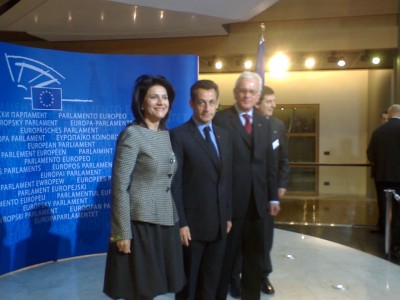
(Photo taken earlier during Sarkozy's 1st visit at EU Parliament, in 2007 : Sarkozy and Merkel's Ideas for a Political Europe inspire also other EU politicians accross the continent)...
Polls
SMF Recent Topics SA
- Record Hospitalisati... (0) by Breadman
- How Many Infected by... (1) by Thunderbird
- Real Cause for Europ... (0) by Breadman
- Interesting Australi... (0) by Aurora
- Plus de mRNA Faux-&q... (0) by Aurora
- EU: Lukashenko as E... (0) by WKalina
- Why NATO in Ukraine,... (0) by Geopol
- Afghanistan's key : ... (0) by Thunderbird
- Anti-Pass Demonstrat... (0) by Aurora
- Veran - Fioraso : Mê... (1) by JohnsonE



















